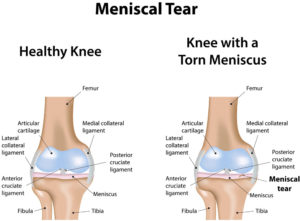Meniscus Tear Specialist

Are you experiencing pain and stiffness in your knee? If so, you may have torn your meniscus. A meniscus tear is among the most common knee injuries. A torn meniscus can occur in several different ways. Meniscus tear specialist, Dr. Jervis Yau provides diagnosis and both surgical and nonsurgical treatment options for patients in Santa Barbara who have torn their meniscus. Contact Dr. Yau’s team today!
What are Meniscus Tears?
There are two wedge “c” shaped pieces of cartilage found within the knee joint that act like “shock absorbers” between the femur (thighbone) and the tibia (shinbone) known as the meniscus. These two tough and rubbery cartilage discs also help assist the knee ligaments with joint stability. When injury occurs to the meniscus, patients often experience pain, clicking or popping, swelling and stiffness. A meniscus tear is quite common in both the athletic and non-athletic population since it can be caused by a twisting event or through natural wear and tear of the joint. Dr. Jervis Yau, Santa Barbara, Goleta, Santa Maria and Ventura, California orthopedic knee specialist, is highly trained and experienced at diagnosing and treating injuries to the meniscal cartilage of the knee.
There is a meniscus located on both the medial and lateral compartments of the knee joint known as the medial and lateral meniscus, respectively. Both absorb shock when the knee is placed under stress from walking, running, squatting and participating in sports. If a meniscus tear occurs during one of these activities or from the meniscal tissue becoming brittle from aging, the meniscus loses its ability to function as intended. Over time, this can cause degeneration of the articular cartilage found on the ends of each bone and lead to development of painful osteoarthritis.
What are the Symptoms of a Meniscus Tear?
Patients often report pain, swelling and stiffness after sustaining a meniscus tear. It may also cause clicking, catching and locking of the joint during certain movements. Many patients may also experience their knee giving way when the torn meniscus gets caught within the joint. Commonly, patients are able to walk immediately following the meniscus tear but may lose that ability over a few days as the knee joint gradually stiffens and becomes more swollen.
How are Meniscus Tears Diagnosed?
Dr. Yau will perform a complete medical review and physical examination to diagnose the meniscus tear. He will look for changes or deformities in the injured knee during the examination. He will also perform tests that involve bending the patient’s knee and rotating the leg inward to assess pain level or clicking as the leg is straightened. Dr. Yau will commonly perform x-rays to evaluate the bony structure of the knee. Furthermore, MRI scan is typically obtained to confirm the diagnosis and rule out other additional injuries to the knee.
How is a Meniscus Tear Treated?
Treatment of meniscus tears vary based on tear pattern and location within the knee joint. Dr. Yau will consider a patient’s age, activity level and other associated knee injuries in determining the optimal treatment program.
Non-Surgical
The outside portion of the meniscus has a rich blood supply and the ability to heal on its own. Patients who experience a knee cartilage injury in this area may find successful healing through a conservative approach. Non-surgical measures commonly include activity modification, anti-inflammatory medications (NSAIDs) and physical therapy to aid in the healing process.
Surgical
The inner portion of the meniscus has minimal blood supply so chances of healing are unlikely. If symptomatic, surgery will be recommended. Dr. Yau strives to preserve as much healthy meniscus as possible due to its protective effect on the knee. Patient’s age, size and location of the tear, along with the presence of other related knee damage helps Dr. Yau to determine the best treatment options for meniscal tears. When possible, Dr. Yau will utilize meniscus surgery sutures to repair the meniscus in order to facilitate healing and preservation of meniscal function. If the meniscus tear is degenerative, complex and non-repairable, the torn portion of the meniscus is removed arthroscopically to provide stability to the remaining segment, which is known as a meniscus transplant.
For additional resources on a meniscus tear or other knee cartilage injury, please contact the orthopedic office of Dr. Jervis Yau, knee specialist located in the Santa Barbara, Goleta, Santa Maria and Ventura, California communities.
